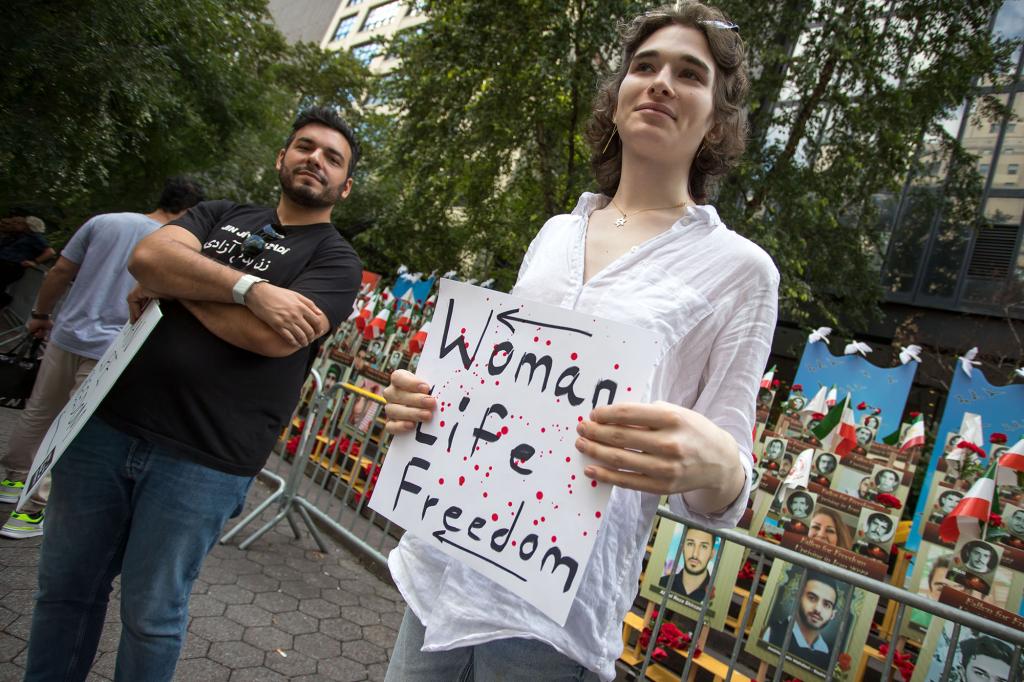
With the Iranian regime’s president in New York, speaking to the United Nations just days after the anniversary of an uprising sparked by a brutal regime murder, it is essential the international community reflect on the far-reaching implications of this critical chapter in my nation’s history.
Over the past year, Iran’s political terrain has undergone profound transformation.
The regime is gripped by severe panic over impending protests, while the organized opposition continues to garner momentum.
The world needs to recalibrate its approach toward this volatile regime — instead of continuing to appease and assist the murderers of the Iranian people.
The tragic death of Mahsa Amini, a 22-year-old victim of the regime’s “morality police,” triggered the September 2022 uprising.
The embers of anger swiftly transformed into a sweeping blaze of protest against the entire theocracy that engulfed more than 220 cities, spanning all 31 provinces.
The world bore witness to the eruption of the Iranian people’s deep-seated yearnings for freedom, with women emerging as the uprising’s undaunted leaders.
The unequivocal rejection of both monarchy and theocracy reverberated across the protests with the resounding cry, “Down with the oppressor, be it the shah or the supreme leader.”
The leading opposition movement, Mujahedin-e Khalq, has published the identities of at least 750 protesters the regime has killed.
The demonstrators’ determination and courage were the culmination of a tireless battle, spanning the last four decades, against a regime defined by its brutality and oppression — a battle in which women have consistently led the way.
The reverberations of this uprising have intensified internal schisms at the highest levels and stoked a palpable fear of the future, along with a hemorrhaging of the regime’s ranks.
The resurgence of mass protests, which by all logic would be more potent and powerful, is Tehran’s most dreaded nightmare.
Supreme Leader Ali Khamenei orchestrated Ebrahim Raisi’s ascent to the presidency with the aim of forging a more unified regime to forestall a recurrence of mass protests in 2018 and 2019.
The 2022 uprising shattered even this semblance of regime cohesion, prompting a reevaluation of its strategy.
A recent so-called “purification wave,” spearheaded by Raisi, has seen the expulsion of dozens of university professors.
It’s further evidence of the regime’s profound anxieties, notably regarding universities, which have historically served as bastions of spirited resistance against dictators.
Now the regime has embarked on yet another sweeping purge.
This internal cleansing has even reached the doorstep of Islamic Revolutionary Guard Corps Brig. Gen. Mohammad Baqer Qalibaf, parliamentary speaker and a former close confidant of Khamenei himself.
The waves of popular discontent are irrefutable evidence of the regime’s failure to fortify its internal cohesion and of its inexorable incapacity to forestall the recurring emergence of uprisings.
So Khamenei has intensified repression.
There have been more than 500 executions since January 2023, according to international human-rights organizations.
While these tactics may ratchet up intimidation in the immediate term, they will ultimately inflame dissent over the long haul.
Resistance Units inside Iran are the driving force for organizing and galvanizing an impassioned population.
At least 3,600 members of these units have disappeared or been apprehended or killed.
Nevertheless, Resistance Units continue to proliferate across Iran.
These brave youth operate covertly, enduring the constant specter of imprisonment, torture and even death, cementing their role as the very backbone of the Iranian protest movement.
The Iranian people’s yearning extends far beyond cosmetic alterations to dress codes.
Their ultimate goal is nothing less than toppling the oppressive regime and establishing a genuine democratic republic, casting off the shackles of both the shah’s dictatorship and the mullahs’ theocratic rule.
Democratic change in Iran has ceased to be a matter of conjecture; it has evolved into an inescapable reality.
The unyielding resolve of the people, coupled with the growing unrest within the regime, renders the status quo untenable.
A decisive and steadfast Western policy toward the Iranian regime can no longer be a mere exercise in prudence; it has become an imperative.
Tehran’s theocracy is at its weakest. It’s never been more in need of appeasement and diplomatic maneuvering — which, unfortunately, it’s getting.
Unfreezing billions of dollars of Iranian people’s money and handing it over to the regime is a gift to Khamenei and his Revolutionary Guards for suppression, war and terrorism.
The international community bears a moral obligation to stand with the Iranian people, who have made monumental sacrifices in their unrelenting quest for freedom.
We don’t ask for help overthrowing the regime. We simply ask Western governments to stop providing these murderers aid.
Then we can build a peaceful future based on the ideals of a secular, democratic and non-nuclear republic.
Maryam Rajavi is the president-elect of the Paris-based National Council of Resistance of Iran.
𝗖𝗿𝗲𝗱𝗶𝘁𝘀, 𝗖𝗼𝗽𝘆𝗿𝗶𝗴𝗵𝘁 & 𝗖𝗼𝘂𝗿𝘁𝗲𝘀𝘆: nypost.com
𝗙𝗼𝗿 𝗮𝗻𝘆 𝗰𝗼𝗺𝗽𝗹𝗮𝗶𝗻𝘁𝘀 𝗿𝗲𝗴𝗮𝗿𝗱𝗶𝗻𝗴 𝗗𝗠𝗖𝗔,
𝗣𝗹𝗲𝗮𝘀𝗲 𝘀𝗲𝗻𝗱 𝘂𝘀 𝗮𝗻 𝗲𝗺𝗮𝗶𝗹 𝗮𝘁 dmca@enspirers.com


